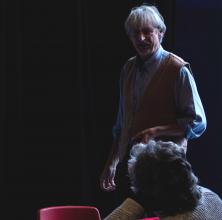The Northern School of Permaculture
You are here
Bringing education back home
This is the source of a short talk at the AGM of Todmorden Learning Centre in November 2018. TLC are negotiating with their Local Authority to take over the redundant College building in the town and reopen it as a sustainability centre.
 As we look towards a cloudy future, it's my job to bring you some good news. I have friends working in difficult circumstances round the world and, even in areas that have been devastated. There is much that has been achieved by people working together in their localities.
As we look towards a cloudy future, it's my job to bring you some good news. I have friends working in difficult circumstances round the world and, even in areas that have been devastated. There is much that has been achieved by people working together in their localities.
In Detroit, USA, years of industrial decline have left large swathes of urban wasteland. In the worst areas, following total economic collapse, they became lawless after the 2008 crisis, run solely by drug gangs. Many houses were repossessed by the banks and then torn down by the authorities. Gardeners have either bought the plots for next-to-nothing, or are just squatting them. There has been a huge upsurge in urban farming and horticulture, bringing cheap and healthy food to a struggling local population.
Not everyone likes change. In one area of renewal, a dogged resident goes around on a ride-on mower, trying to tidy up the neighbourhood, but with a tendency to damage other people's vegetable plots. But the gardeners didn't hold too much of a grudge. One wise old woman told my friend that "not everybody is ready for the changes that are coming, and most people are carrying a lot of pain". Urban farming continues to flourish in those post-industrial, "post-financial", neighbourhoods.
In war-torn Syria, in the predominantly Kurdish area in the north (popularly known as Rojava), people are rebuilding their communities after successfully driving the ISIS forces out of their territory. The municipalities have recognised the authority of the Syrian government, but they have little or no external support, they are now effectively an autonomous region. Against all the odds, they have completely re-established their education system, to the point where they now have several universities open - a particular achievement as there were no universities in the region at the outset of the Syrian Civil War in 2011.
In Ethiopia, I have a young colleague who has been working to establish demonstration sites and train villagers in the latest sustainable agriculture techniques. He has been so successful, he is now training his successors, teaching in the different local languages, and he has taken up the offer to study renewable technologies at a prestigious university in Germany.
I find these examples from other countries encouraging, but maybe one of the lessons from these faraway places is that things have not got bad enough in most of Europe for neighbours to truly pull together to rebuild their communities. But these repairs are becoming overdue.
The education system that is now falling apart around us was conceived and built during the darkness of the second world war and even a cursory look at it suggests that its current state is a travesty of the "free education" system that Beveridge and his colleagues proposed back then. We would do well to take a fresh look at that pioneering work and apply it to the here-and-now in Todmorden. Instead of "national policy" we need to focus on the needs of people, especially the young people of the town.
The main barrier to progress with community projects is premises. More than policies, initiatives and plans, people need space to work from, places to interact, to share experience and information. A college building in town is ideal for this!
My own experience was running a local community company working out of an office above an abandoned shop in New Lane in Bolton, working alongside the excellent Community Education Service. I soon learned that enterprise development required me to do less, and listen more, have an "open door" and create a welcoming environment. Soon, we found that people coming for "training" would drop in to see us and discuss their ideas for improving the neighbourhood, even to the point of starting new businesses. I didn't need to come up with ideas of my own, local people were perfectly capable of that. All I had to do was to organise our resources to support that creativity within the community.
We withdrew from there once huge waves of "regeneration" money hit the area, bringing central, Town Hall, Westminster and EU planning with it, so wiping away the small, the intimate and the local. My experience has grown since then and I know that I am in tune with my colleagues all round the country, and indeed around the world - we can improve education and training by adapting to our immediate environment, concentrating more on local needs, rather than "targets".
We have a big opportunity arising from running the Todmorden Community College building as a Community Hub. Where better to determine the needs of Todmorden people, and to train up our young people to meet those needs? This "local" approach will give us a creative advantage in dealing with our uncertain future.
-----------------------
Following careers in industry and in urban regeneration, Angus Soutar works as an independent whole-systems consultant. He is part of the world-wide network of trainers in permaculture design.
Theme by Danetsoft and Danang Probo Sayekti inspired by Maksimer
